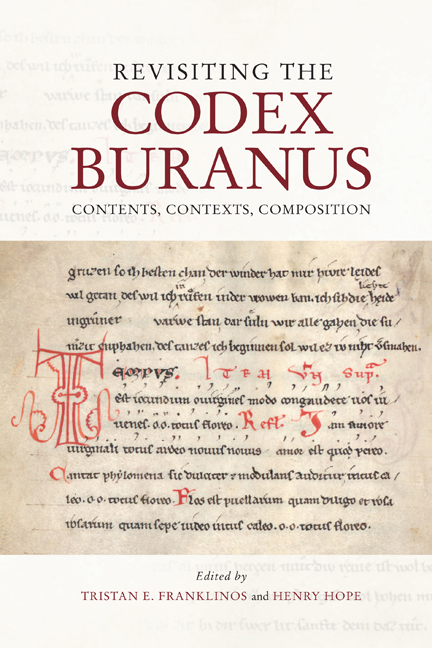Book contents
- Frontmatter
- Contents
- List of Illustrations
- Acknowledgements
- Abbreviations
- Dedication
- Introduction: The Codex Buranus – A Unique Challenge
- Chapter 1 A Modern Reception History of the Codex Buranus in Image and Sound
- Chapter 2 Parody in the Codex Buranus
- Chapter 3 Satire in the Codex Buranus
- Chapter 4 ‘Artes Amatorie Iam Non Instruuntur’: Learned and Erotic Discourse in the Carmina Burana
- Chapter 5 Classical Learning and Audience in the Carmina Amatoria: A Case-Study on CB 92
- Chapter 6 Rape, the Pastourelle, and the Female Voice in CB 185
- Chapter 7 Rethinking the Carmina Burana III: The Poetry of Peasants
- Chapter 8 Predestination and God’s Grace: The Salvific Architecture of the Religious Songs in the Codex Buranus
- Chapter 9 Revisiting the Plays of the Codex Buranus
- Chapter 10 Revisiting the Music of the Codex Buranus
- Chapter 11 Locating the Codex Buranus: Notational Contexts
- Chapter 12 Plurilingualism in the Codex Buranus: An Intercultural Reconsideration
- Chapter 13 Compilation, Contrafacture, Composition: Revisiting the German Texts of the Codex Buranus
- Afterword: multiformis armonia, scolaris symphonia
- List of Manuscripts
- Bibliography
- Index
- General Index
- Studies in Medieval and Renaissance Music
Chapter 3 - Satire in the Codex Buranus
Published online by Cambridge University Press: 16 September 2020
- Frontmatter
- Contents
- List of Illustrations
- Acknowledgements
- Abbreviations
- Dedication
- Introduction: The Codex Buranus – A Unique Challenge
- Chapter 1 A Modern Reception History of the Codex Buranus in Image and Sound
- Chapter 2 Parody in the Codex Buranus
- Chapter 3 Satire in the Codex Buranus
- Chapter 4 ‘Artes Amatorie Iam Non Instruuntur’: Learned and Erotic Discourse in the Carmina Burana
- Chapter 5 Classical Learning and Audience in the Carmina Amatoria: A Case-Study on CB 92
- Chapter 6 Rape, the Pastourelle, and the Female Voice in CB 185
- Chapter 7 Rethinking the Carmina Burana III: The Poetry of Peasants
- Chapter 8 Predestination and God’s Grace: The Salvific Architecture of the Religious Songs in the Codex Buranus
- Chapter 9 Revisiting the Plays of the Codex Buranus
- Chapter 10 Revisiting the Music of the Codex Buranus
- Chapter 11 Locating the Codex Buranus: Notational Contexts
- Chapter 12 Plurilingualism in the Codex Buranus: An Intercultural Reconsideration
- Chapter 13 Compilation, Contrafacture, Composition: Revisiting the German Texts of the Codex Buranus
- Afterword: multiformis armonia, scolaris symphonia
- List of Manuscripts
- Bibliography
- Index
- General Index
- Studies in Medieval and Renaissance Music
Summary
In Limbo, at the outer edge of Hell, Dante encounters the ancient poets Homer, Ovid, Horace, and Lucan, who were excluded from Paradise because they were not Christian. Modern readers of the Inferno are often surprised to see Horace referred to as ‘Orazio satiro’ (‘Horace the satirist’) because, since the Renaissance, Horace has been most admired for his Odes. In the Middle Ages, however, it was his Satires and Epistles (especially the first book) that were most widely read. The moral code advocated (explicitly or implicitly) in these works, in which the pagan gods seldom figured, seemed broadly compatible with Christianity, unlike Ovid's Metamorphoses, long a guilty but irresistible pleasure, only partially legitimised by an ingenious system of allegorical interpretation. For similar reasons, the other two classical satirists, Persius and Juvenal, whose satires tend to be angrier and more biting than Horace’s, were also popular, though these two poets (especially Persius) are considered among the most challenging classical authors to read today. All the classical satirists wrote in continuous dactylic hexameters, though the language was more informal and the feel of the line more akin to conversation than the formal structure and tone of the hexameters used in epic; their targets were the foolish or inconsiderate ways of their contemporaries.
Little in the way of satire survives from late antiquity or the Carolingian period but the genre was revived by Hugh Primas, who was active in Paris in the 1140s. We know little about his life but, to judge from his poems, he seems to have spent much of it wandering around France performing at various courts. His nickname, which acknowledges his primacy among contemporary poets, shows that he was much admired. He broke the rules in the forms he used, for besides the traditional continuous dactylic hexameters, he wrote satire not only in elegiac couplets (alternating hexameters and pentameters), but also in the accentually based rhyming verse that characterises much of the liveliest Latin poetry of the twelfth and thirteenth centuries. Unlike his classical predecessors, he tended to focus on his own weaknesses – his poverty, drinking, gambling, sexual appetite, and general foolishness – rather than those of society.
- Type
- Chapter
- Information
- Revisiting the Codex BuranusContents, Contexts, Compositions, pp. 67 - 96Publisher: Boydell & BrewerPrint publication year: 2020
- 1
- Cited by

